Notes
Over Netanyahu’s Shoulder: A (Telephoto) Analysis of the Prime Minister’s U.N. Speech Edits
These pictures might not be as titillating as the note George Bush wrote to Condi Rice during a General Assembly speech asking if he could have a bathroom break. These edits Netanyahu made to his speech last Friday, however, revealed via telephoto lens by Getty’s accomplished photographer, Mario Tama, are interesting for what they suggest about the Prime Minister’s tactical state of mind.
Though I can’t say with absolute certainty, I’m assuming — given that Netanyahu’s speech to the General Assembly followed Mahmoud Abbas’ speech by about forty minutes — that these edits were motivated by Netanyahu’s attempt (we might even say, his desperation) to somehow offset Abbas’ powerful, warmly-received and historic declaration formally petitioning the UN for Palestinian statehood. Alternately statesmanlike and conciliatory, mixed with passages of acrid hostility and resentment toward the Palestinians, Arab countries, and also the U.N., it’s hard not to see Netanyahu’s speech, at least the goodwill, as something more than pandering. But let’s take a look at the photos starting with the one above, and see what Bibi’s doing with the kind gestures as well as the defensive arguments. (Each photo is followed here with the original, and then the revised text. In some cases, for context, there is more of the delivered text which appears in parentheses.)
Photo 1.Original text (left page):
Thousands of missiles have rained down on our cities.
Revised text (as delivered):
Thousands of missiles have already rained down on our cities.
Citing Palestinian missile strikes in historical terms, an event that might be relegated to the past, Netanyahu changes hist text to frame these strikes as a an ongoing and continuous threat.
Photo 1.Original text (right page). Original text:
Our major cities are 30 to 40 kilometers away from Gaza. But they’re only a few hundred meters away from the West Bank.
Revised text (as delivered):
See, most of our major cities in the south of the country are within a few dozen kilometers from Gaza. But in the center of the country, opposite the West Bank, our cities are a few hundred meters or at most a few kilometers away from the edge of the West Bank.
In the first sentence, Bibi felt the need to make the distance between Israel and Gaza sound that much closer, from “30 to 40 kilometers” to “a few dozen.” Though the distinction is negligible, the need to make the perceived danger even a half-dozen kilometers closer, after hearing Abbas’ speech, seems to demonstrates how pressured Netanyahu is feeling over the prospect of Palestinian statehood to try and elevate the potential threat of the Palestinians that infinitesmal-bit more. At the end of the paragraph, conversely, he is mindful not to shrink the distances beyond what is factual — although that doesn’t stop him from leaving the shorter “a few hundred” meters in the text. Finally, as regards territorial politics, notice how the West Bank is now aligned with the country’s center.
Photo 2. Original text:
(In the last few weeks, American officials have put forward ideas to restart peace talks. There were things in those ideas about borders that I didn’t like. There were things there about the Jewish state that I’m sure the Palestinians didn’t like.
But with all my reservations, I showed my willingness to move forward.
Revised text (as delivered — including the preceding couple of lines):
But with all my reservations, I was willing to move forward on these American ideas.
The written text wants to suggest that Netanyahu was fully open to recent proposals, even if he had his reservations — although a show of willingness is actually less constructive or convincing that actually willingness itself. In the revision, Netanyahu changes the tone from a passive voice, demonstrating more intention. (Notice also, by the way, how he feels the need to make attribution again (to reduce his own responsibility, perhaps?) to the Americans.
Photo 3. Original text:
(Must this conflict continue for generations,) Or will we enable our children and grandchildren to speak in years ahead of how we found a way to end it?
Revised text (as delivered):
(Must this conflict continue for generations,) Or will our children and our grandchildren speak in years ahead of how we found a way to end it? That’s what we should aim for, and that’s what I believe we can achieve.
In this paragraph, we not only see how Netanyahu makes the tone more declarative and more active/aggressive (the removal of “enabling” emphasizes action and insistence over process — to be able to “create the conditions for” versus having seen it through), but we see how he makes the message that much more unilateral and demanding, adding “THAT’S WHAT WE SHOULD AIM FOR!” in all caps — with an exclamation mark, too.
Photo 4. Original text (left-side page):
We share the same land.
Revised text:
We dwell in the same land.
In the revision, Netanyahu eliminates the word “share.” Sure, “share” and “dwell,” on one level, are virtually synonymous. At the same time, however, the word “share” connotes something cooperative and personal vs. “dwell” is more incidental, a cold statement of fact. If there is any edit that captures Netanyahu as insincere about friendship and “joining hands,” it’s this one.
Photo 5. Original text:
President Abbas, I am extending my hand – the hand of Israel – in peace.
Revised text:
President Abbas, I extend my hand – the hand of Israel – in peace.
Same as in photo #2 above, we see in such trifling edits the sense of immediacy. This passage is now in the more active, present voice versus the gerund form (using -ing). Right at the end of the speech, the passage illustrates just how much Netanyahu feels the need to make something happen (even if that something is simply to more sharply and immediately look the part of an eager and willing partner).
Photo 6.
About two-thirds of the way into a speech which begins and ends as an exercise in peace, love and vigorous olive-branch waving, Netanyahu turns prosecutorial and rueful. This hand-written passage shows up at the end of the passage below from the revised version Netanyahu delivered. Notice how he draws a specific comparison between the Palestinians and the Nazis as regards the proposal for the Palestinian state:
The Jewish state of Israel will always protect the rights of all its minorities, including the more than 1 million Arab citizens of Israel. I wish I could say the same thing about a future Palestinian state, for as Palestinian officials made clear the other day – in fact, I think they made it right here in New York – they said the Palestinian state won’t allow any Jews in it. They’ll be Jew-free – Judenrein. That’s ethnic cleansing. There are laws today in Ramallah that make the selling of land to Jews punishable by death. That’s racism. And you know which laws this evokes.Israel has no intention whatsoever to change the democratic character of our state. We just don’t want the Palestinians to try to change the Jewish character of our state. We want to give up the fantasy of flooding Israel with millions of Palestinians.
President Abbas just stood here, and he said that the core of the Israeli-Palestinian conflict is the settlements. Well, that’s odd. Our conflict was raging for nearly half a century before there was a single Israeli settlement in the West Bank. So if what President Abbas is saying was true, then the – I guess that the settlements he’s talking about are Tel Aviv, Haifa, Jaffa, Be’er Sheva. Maybe that’s what he meant the other day when he said that Israel has been occupying Palestinian land for 63 years. He didn’t say from 1967; he said from 1948. I hope somebody will bother to ask him this question because it illustrates a simple truth: The core of the conflict is not the settlements. The settlements are a result of the conflict.
It would be interesting to know how many pages of hand-written notes coincide with that section of the speech, and with this attacking voice (especially where the letters get even larger and the voice more sarcastic — the right-side page here containing only seven words). If Netanyahu, as he scribbled away at the rhetorical edges, was feeling a sense of urgency about the opportunity for peace, its seems more motivated out of fear that the Palestinians had scored a coup with their statehood application than anything else.
PHOTOGRAPHS by Mario Tama/Getty Images.
(Transcript of final speech via Jerusalem Post. Netanyahu and Abbas speeches viewable here.)
(caption: Benjamin Netanyahu, Prime Minister of Israel, delivers an address to the United Nations General Assembly at U.N. headquarters on September 23, 2011 in New York City. This is the 64th session of the United Nations General Assembly including heads of state from over 120 countries.)
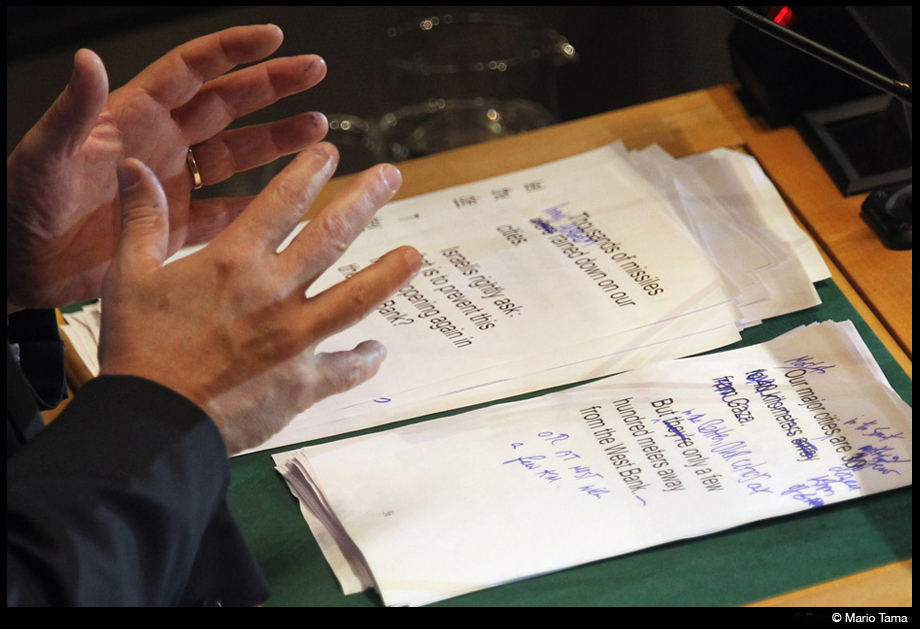

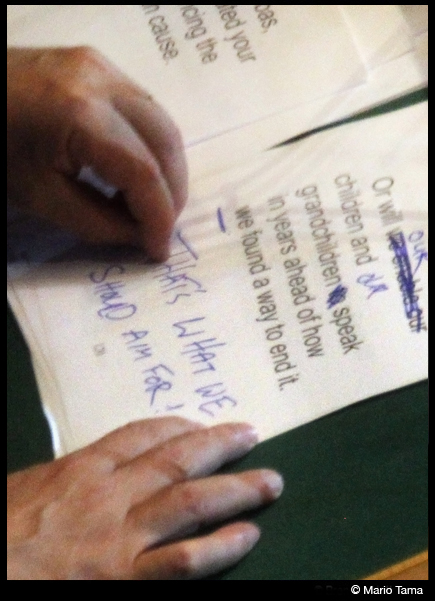
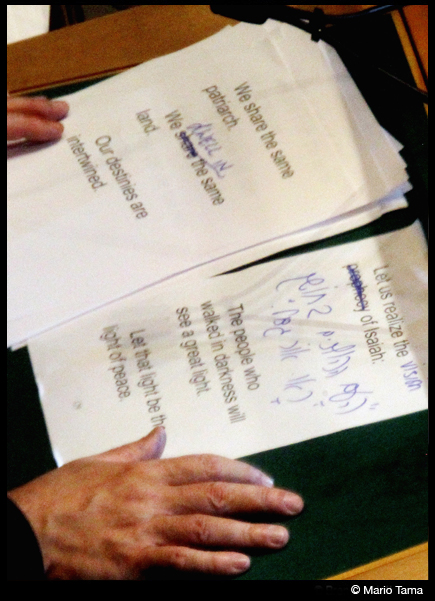
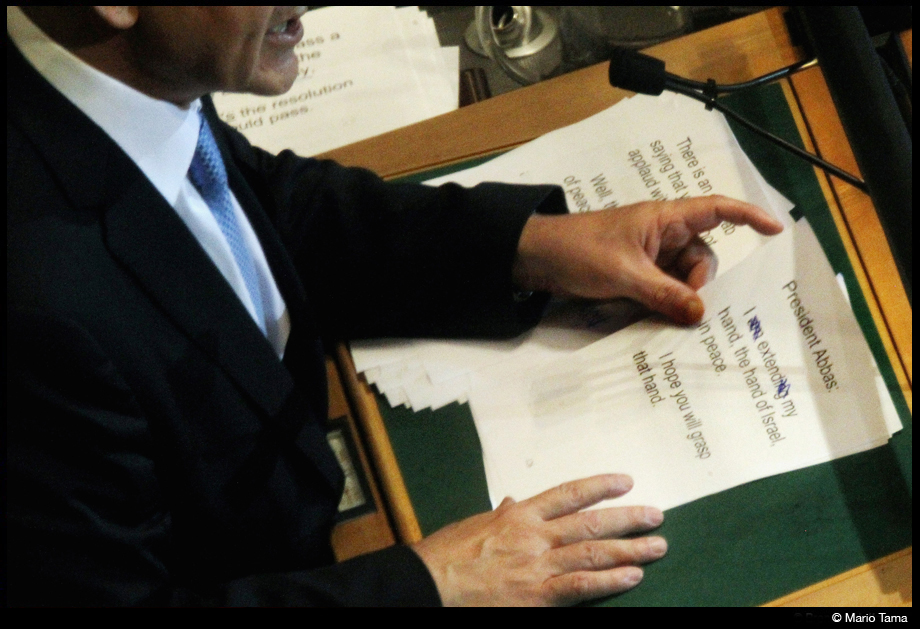
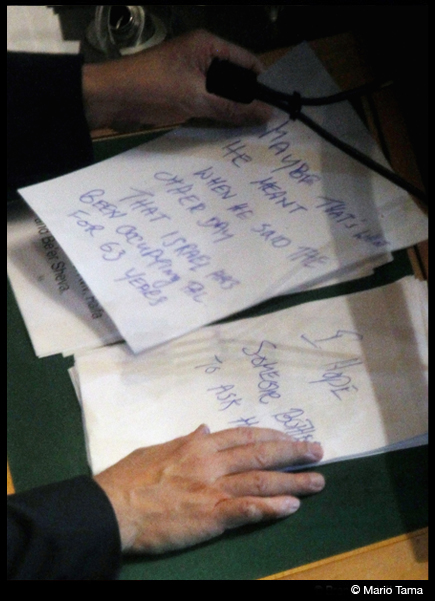
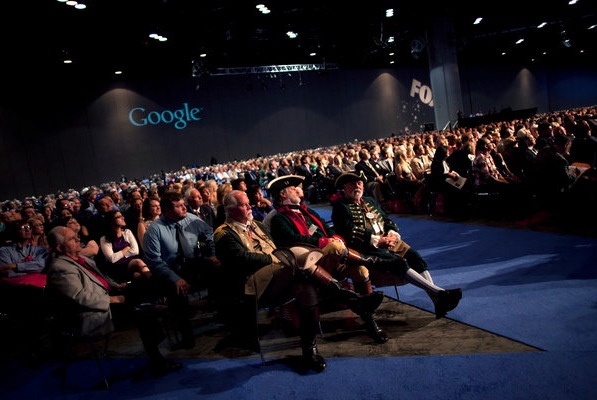
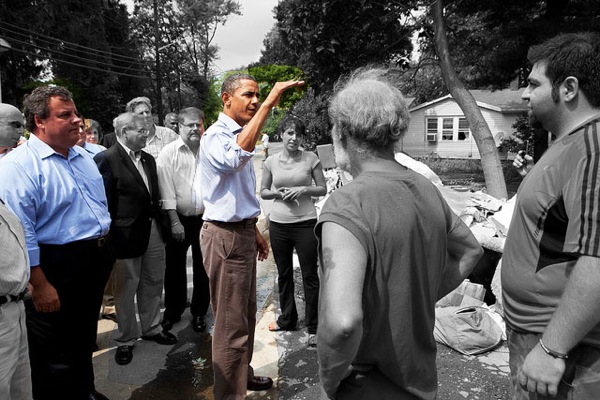
Reactions
Comments Powered by Disqus